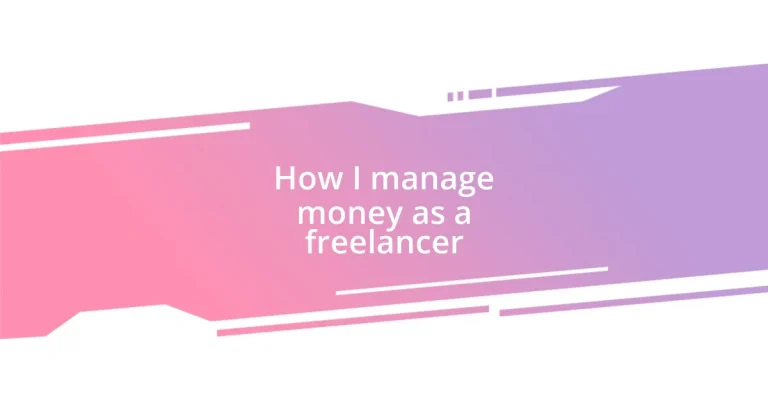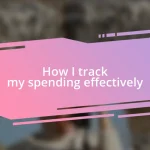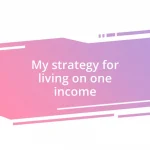Key takeaways:
- Understanding and managing freelancer finances, including income tracking and budgeting, is crucial for long-term sustainability and confidence in freelancing.
- Proactively saving for taxes and planning for retirement helps mitigate anxiety related to unexpected financial responsibilities and ensures future security.
- Investing in personal growth through structured learning and collaborative exchanges with peers enhances skills, increases opportunity, and fosters a sense of community among freelancers.
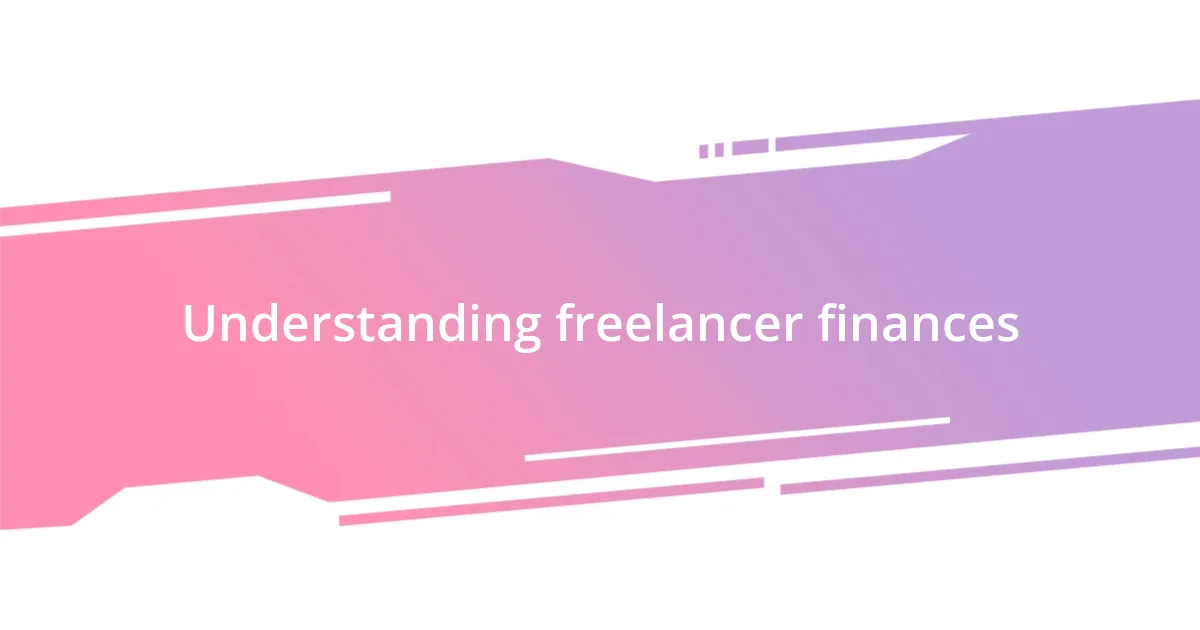
Understanding freelancer finances
Understanding freelancer finances is essential for sustainability in this career path. I remember my early days as a freelancer when I landed a big project but didn’t realize how quickly my excitement would wane once I faced unexpected expenses. How could I have let myself be so unprepared? This experience taught me that having a clear grasp on both income and expenditures is critical.
It’s easy to have an influx of cash one month and then face a dry spell the next. I’ve often found myself feeling a rush of anxiety when payments are delayed or when I realize I’m one client short for the month. This uncertainty underlines the importance of budgeting and maintaining an emergency fund. I can’t stress enough how vital it is to anticipate these fluctuations, both mentally and financially.
Freelancing isn’t just about what you earn; it’s about how you manage what you earn. I’ve learned the hard way that tracking your income streams and knowing your regular expenses allows you to maintain control over your financial landscape. Don’t you think understanding your finances makes you feel more empowered? It certainly did for me, transforming my freelance journey from chaotic to confident.
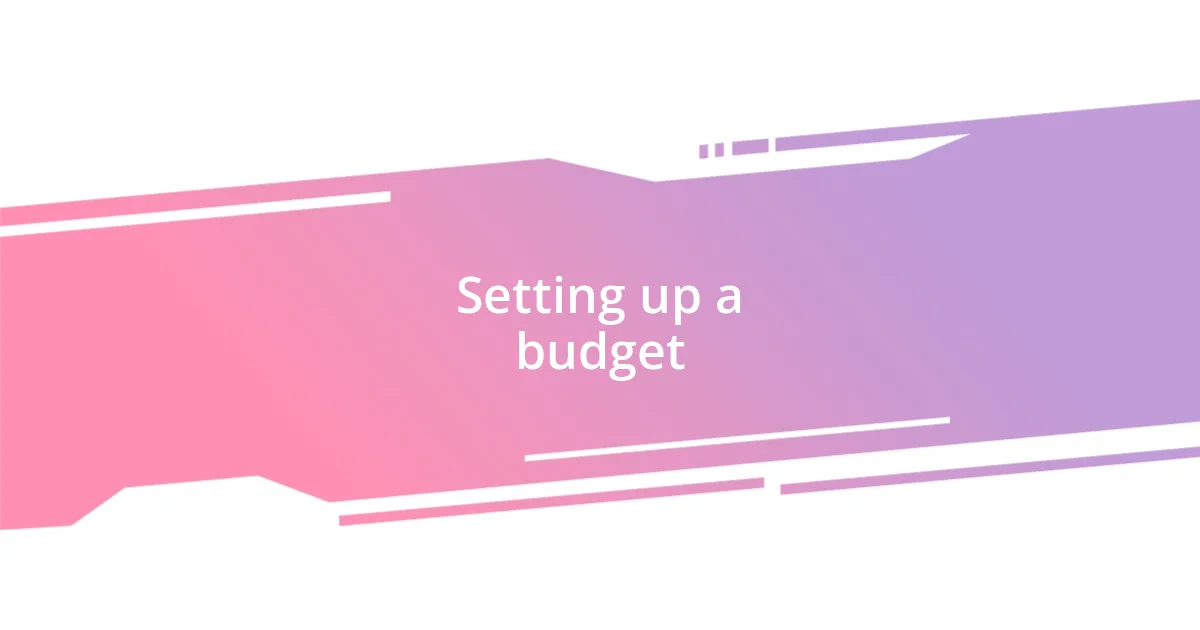
Setting up a budget
Setting up a budget is a game-changer for freelancers like me. In my early freelancing days, I was hesitant to allocate specific amounts to different categories. I quickly learned that without a solid budget, I was cruising through my finances with no real direction. The first time I felt the sting of overspending was when I splurged on a new laptop for a big project, only to realize I didn’t have enough left to cover my monthly bills.
To create a functional budget, I recommend following these steps:
- Identify your income: Track all your sources, including recurring projects and occasional gigs.
- List all expenses: Break them down into fixed (rent, internet) and variable (groceries, subscriptions).
- Set savings goals: Consider allocating a percentage of your income for savings or investments.
- Adjust regularly: Revisit your budget monthly to make necessary adjustments based on income fluctuations or unexpected expenses.
- Use tools: Leverage budgeting apps or spreadsheets to keep everything organized and accessible.
By following these steps, I’ve found budgeting to be not just a task, but a roadmap to financial peace. Engaging in this process has truly made budgeting feel like my financial lifeline!
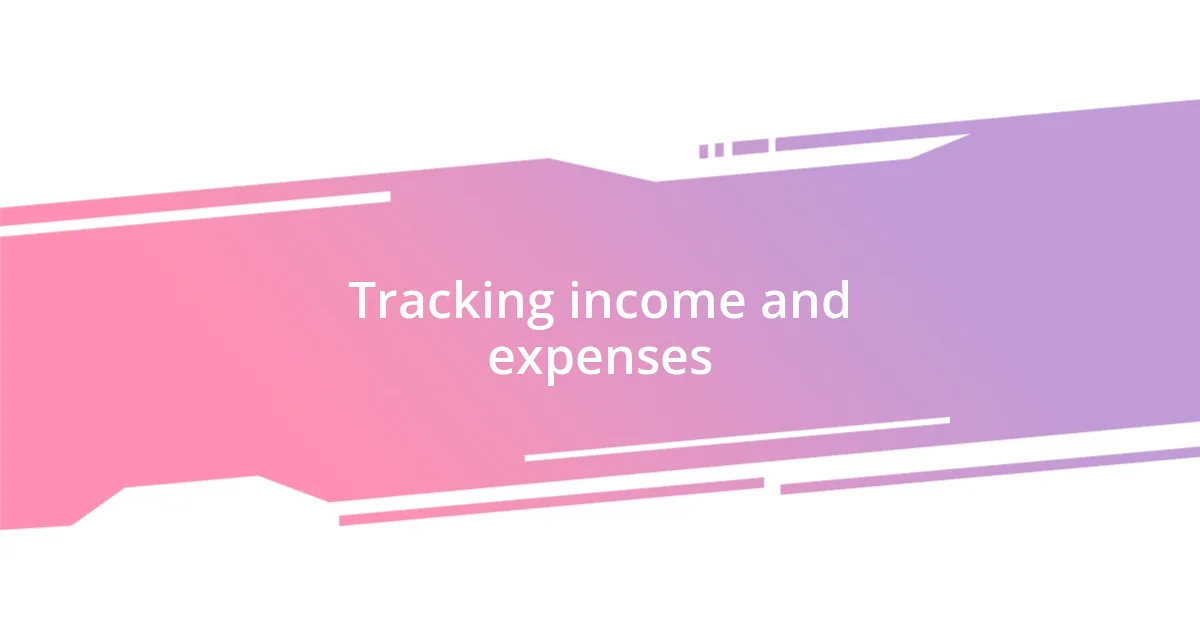
Tracking income and expenses
Tracking income and expenses is more than just a necessary task; it’s an empowering practice that transforms chaos into clarity. I remember feeling overwhelmed by the sheer volume of invoices and receipts piling up on my desk. It became apparent that I needed a systematic approach. By dedicating time each week to review and categorize my income and expenses, I unlocked a deeper understanding of my financial health. This small commitment has made a significant difference in my peace of mind.
It’s interesting how a simple tracking method can unveil patterns in your spending and income. I often use a spreadsheet that lists my earnings next to my expenditures. This visual representation allows me to assess my financial situation at a glance. Have you ever noticed how seeing numbers laid out can spark new insights? For example, I discovered that I was spending too much on coffee runs during work hours, which led me to cut back and make my own brews at home. This not only helped my budget but also added a bit of joy to my mornings.
Leveraging technology has also been a game-changer in my freelance journey. I tried various apps designed for expense tracking and found one that aligns perfectly with my needs. Not only does it allow me to quickly input expenses on the go, but it also generates reports that help me visualize trends over time. Imagine how motivating it is to watch your savings grow each month as you refine your spending habits. This kind of tracking doesn’t just keep you informed; it fuels your confidence and drives better decisions for future projects.
| Tracking Method | Characteristics |
|---|---|
| Spreadsheet | Customizable layout, visual overview of income & expenses |
| Expense Tracking App | Portable, instant input, generates reports |
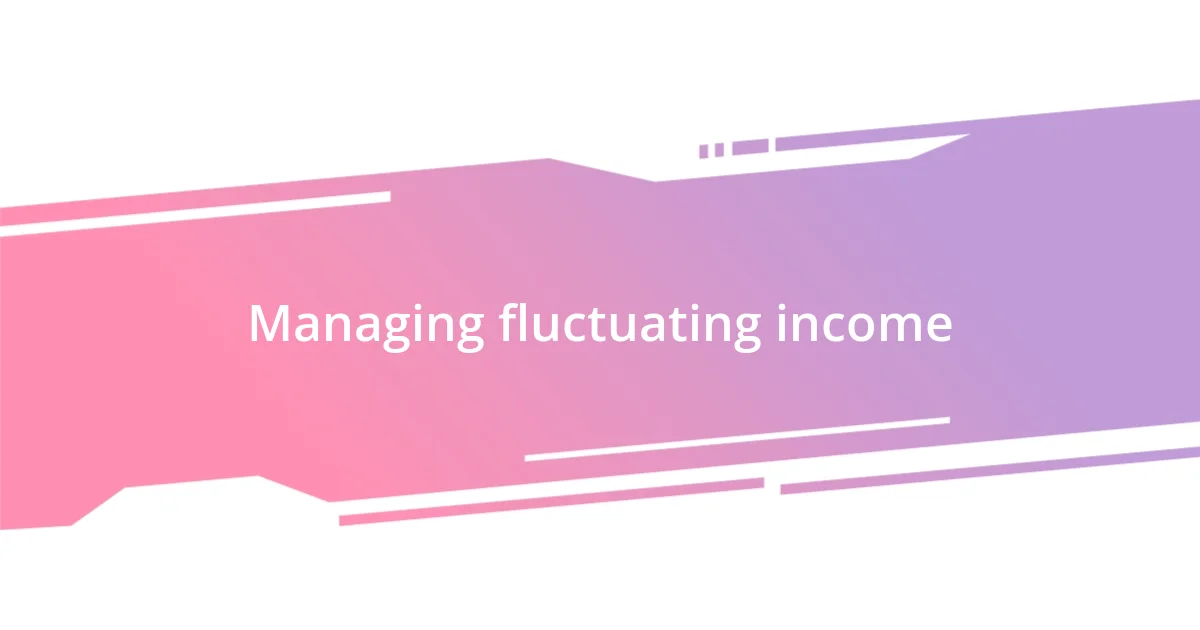
Managing fluctuating income
Managing fluctuating income is certainly one of the most challenging aspects of freelancing. I remember a particularly rough month where payments from clients were delayed, and I felt that familiar knot in my stomach. It hit me then how crucial it is to not only manage but anticipate those ebbs and flows. So, I learned to think ahead and establish a financial buffer—having savings set aside has given me a sense of security. Have you ever felt that anxiety when a paycheck is late? Creating a cushion allows for peace of mind during those unexpected droughts.
To effectively manage my income highs and lows, I’ve implemented a proactive strategy around income allocation. After receiving a project payment, I allocate a percentage right away into savings, essential expenses, and personal funds. I call it my ‘paycheck triage.’ It’s like a mental game I play; instead of seeing it all as just income, I view it as a mosaic that needs balance. This approach fosters discipline. If you’ve ever struggled to make ends meet in a lull, reallocating those funds can help manage unpredictability much more effectively.
I’ve also embraced the power of diversifying my income streams. Relying on one or two clients was a pitfall that left me anxious at times. So, I started exploring various platforms and services to offer my skills. Whether it’s taking on side projects or teaching workshops, each new opportunity has expanded my financial landscape. Isn’t it fascinating how one shift in your strategy can lead to new doors opening? This diversification not only enhances my income but also enriches my experience, providing me with a sense of stability that makes the ups and downs a bit easier to navigate.
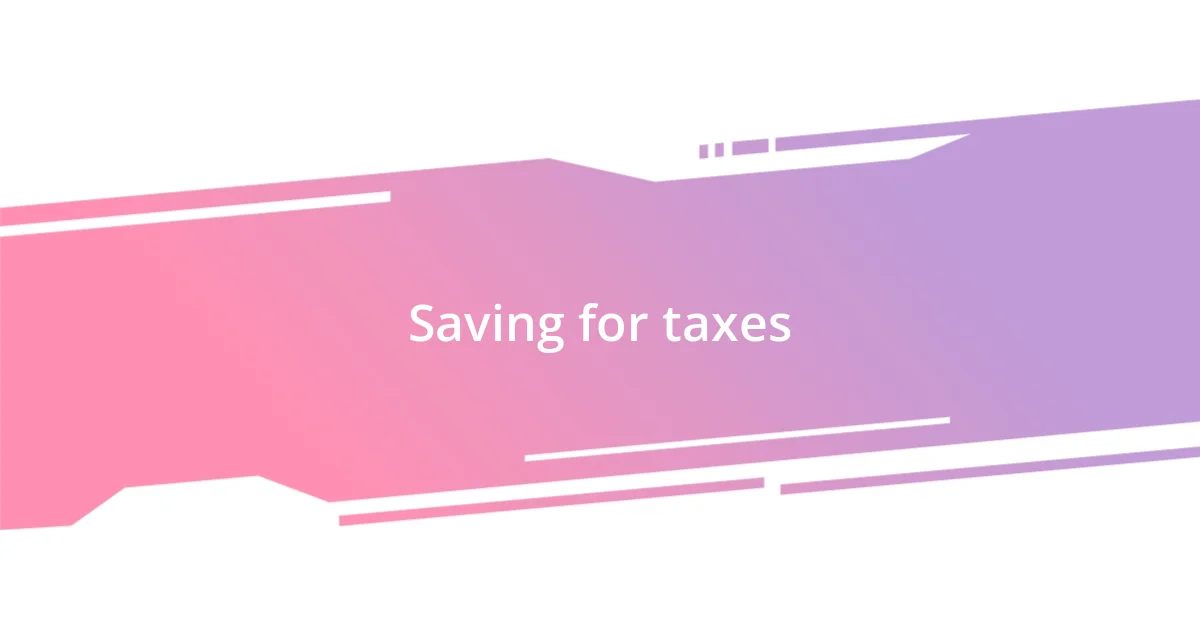
Saving for taxes
Setting aside money for taxes has been an essential part of my freelancer journey. I learned the hard way that taxes don’t take a vacation, and ignoring them can lead to sleepless nights. Knowing that I need to cover a percentage of my income for taxes, I decided to stash away a specific portion from each paycheck. This simple act transformed my dread of tax season into a manageable task. Do you ever feel that weight lift when you’re prepared?
I recall a particular year when I wasn’t diligent about saving for taxes. When tax season rolled around, I found myself scrambling to scrape together the funds. The anxiety was palpable, making it difficult to focus on my work. Since then, I’ve made it a must to create a dedicated tax savings account. Each month, I automatically transfer a predetermined amount into that account. It’s like my little safety net, and surprisingly, it feels rewarding to watch it grow, rather than shrinking my bank balance when taxes are due.
Engaging with other freelancers has taught me that saving for taxes can be more than just a personal responsibility; it can also be a community effort. I remember discussing strategies in a freelancer group and discovering that many of us had similar approaches, which validated my methods. There’s something empowering about sharing and comparing notes with peers. Have you ever realized how much richer your understanding can become through those conversations? They inspire confidence and spark ideas on how to manage finances effectively.
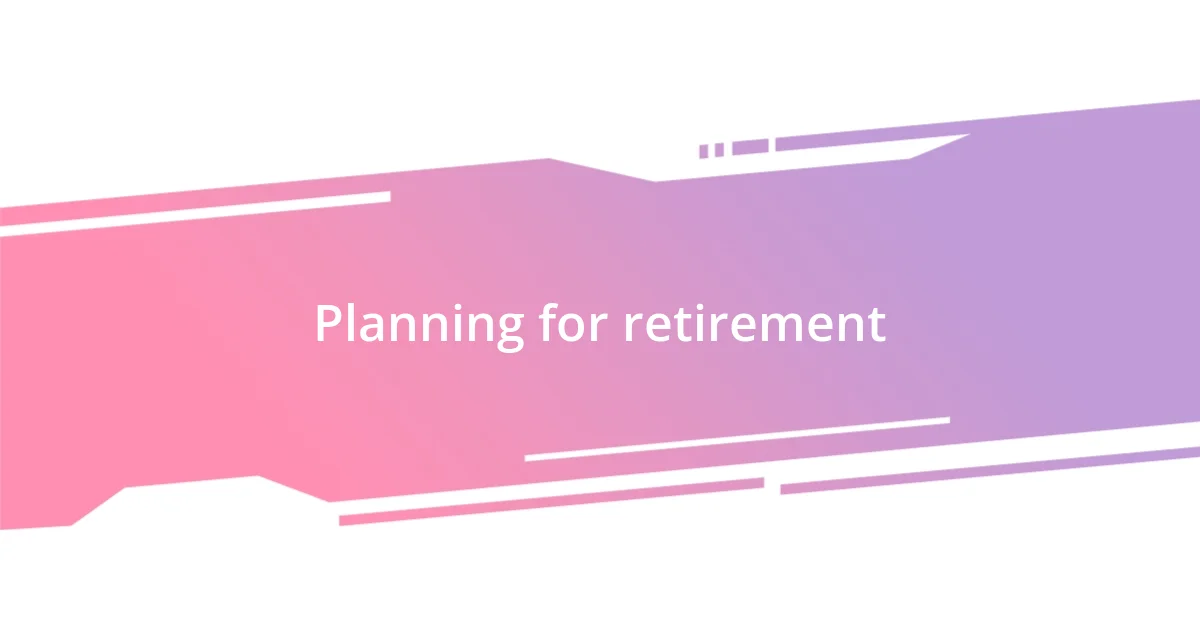
Planning for retirement
Planning for retirement can feel daunting as a freelancer, but I’ve found that the key is to start early. When I first began my freelance journey, I neglected the importance of retirement savings. It wasn’t until I attended a financial workshop that I realized I was essentially working for today, but not for my future. Have you ever had that moment of clarity? I decided then to open a dedicated retirement account and set aside a small amount from each paycheck. That initial step has helped me build a sense of financial security for my later years.
As I continued to grow my business, I made it a habit to reassess my retirement plan regularly. I remember a time when I was hesitant to increase my contributions; it felt like a luxury I couldn’t afford. However, I learned that even small increases can be impactful over time due to compound interest. Has your fear of overspending ever held you back from investing in your future? Embracing a mindset of gradual growth allowed me to balance current needs with future goals, which has been incredibly empowering.
I also discovered the value of diversifying my retirement investments. Rather than just sticking to a basic savings account, I explored options like a Roth IRA or even low-risk index funds. This exploration led me to realize that investing doesn’t have to be intimidating. My gradual learning process about different investment vehicles made me feel more in control of my retirement planning. Think about it: do you know where your money is truly working for you? Feeling confident in where my savings are directed has transformed planning for retirement from a burden into an enlightening journey.
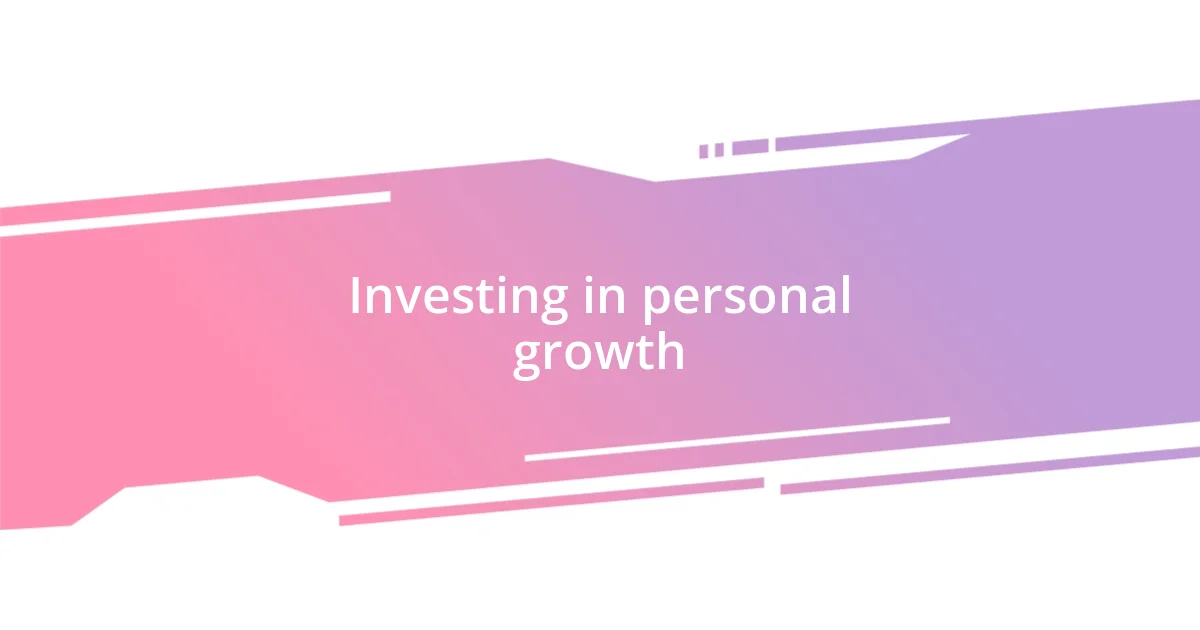
Investing in personal growth
Investing in personal growth has been one of the most fulfilling financial decisions I’ve made as a freelancer. I remember the first time I attended a workshop on enhancing my digital marketing skills. The initial investment felt like a stretch, but the knowledge I gained was invaluable, leading to more clients and, ultimately, increased income. Have you ever found that personal development can offer better returns than any traditional investment?
Over time, I recognized that setting aside a budget for courses, books, or coaching sessions was essential. There was a period when I hesitated, thinking I could learn everything for free online. But I soon discovered that structured learning often brings more clarity and motivation. The moment I committed to a monthly budget for my growth, I felt a shift in my mindset; investing in myself became a priority. Isn’t it amazing how investing in our skills can make us feel more empowered in our careers?
I also love sharing what I learn with fellow freelancers. I recall an inspiring coffee chat with another freelancer where we swapped insights on personal branding. That exchange lit a fire in me, pushing me to refine my online presence. Can you imagine how much growth happens in a single conversation? Collaborating with others on our personal development journeys creates a sense of community and accountability that fuels our motivation. It’s not just about the financial aspect; it’s about the growth we experience together.












